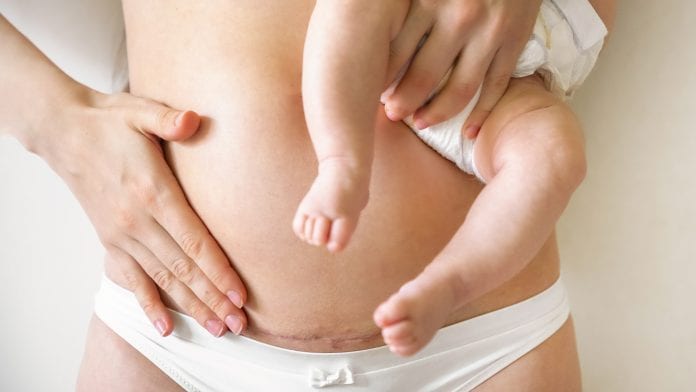
A new study has demonstrated that vital beneficial bacteria can be restored to babies born by caesarean section (C-section).
The human microbiota consists of trillions of bacteria, viruses, fungi, and other microorganisms that live in and on our bodies, some of which are harmful, and others that are beneficial. When a baby is born vaginally, their sterile bodies are provided with these pioneer ‘colonisers’ by their mothers during labour and birth, which helps to develop their immune system. However, babies born by C-section do not have the same healthy bacteria as antibiotics and C-sections disturb this passing of microbes, causing increased risks of obesity, asthma, and metabolic diseases.
The study from Rutgers University and published in the journal Med, has shown that these natural bacteria can be restored – making it the first large observational study to show that restoring a C-section baby’s natural exposure to maternal vaginal microbes at birth normalises the microbiome development during their first year of life.
Restoring vital bacteria
The researchers followed 177 babies from four countries over the first year of their lives – 98 of which were born vaginally and 79 born by C-section, of which 30 were swabbed with a maternal vaginal gauze immediately after birth.
Analysis showed that the microbiota of the C-section babies swabbed with their mother’s vaginal fluids was close to that of vaginally born babies. The mother’s vaginal microbiomes on the day of birth were also like other areas of their bodies (gut, mouth, and skin), showing that maternal vaginal fluids help to colonise bacteria across their babies’ bodies.
Senior author Maria Gloria Dominguez Bello, a professor in the Department of Biochemistry and Microbiology in the School of Environmental and Biological Sciences at Rutgers University-New Brunswick, said: “Further research is needed to determine which bacteria protect against obesity, asthma and allergies, diseases with underlying inflammation.
“Our results support the hypothesis that acquiring maternal vaginal microbes normalises microbiome development in the babies.”
The researchers said the next step is conducting randomised clinical trials to determine if the microbiota normalisation translates into disease protection.






















